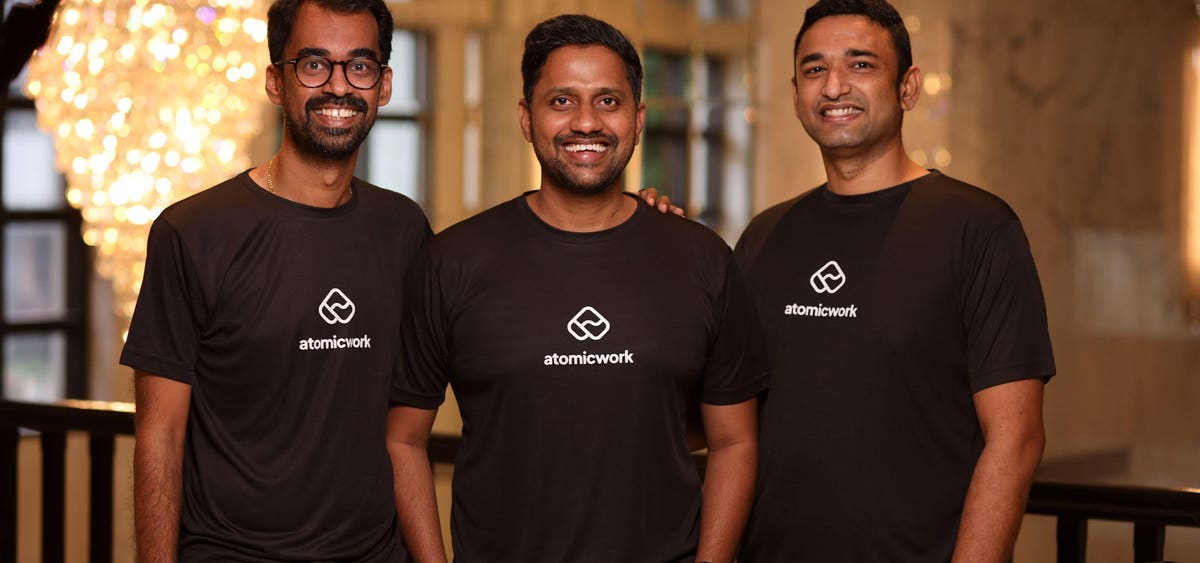Fast-growing companies may excel at serving their customers, but what about the employee experience? As the business evolves at pace, it becomes ever more complex and once-simple processes often spiral out of control; managers throw software at the problem, but that requires employees to get to grips with a plethora of new tools simply to do their jobs.
It is this problem that the San Francisco-based start-up Atomicwork hopes to confront. The company, launched 12 months ago, is today announcing an $11 million seed funding round as it seeks to commercialise the software-as-a-service solution it has developed.
“We have to find a way to simplify these processes and tools for people so they can concentrate on the work they’re supposed to be doing,” says Vijay Rayapati, CEO and co-founder of the business. The issue is particularly acute, he argues, as organisations think about new models of work in the post-pandemic experience. The hybrid approach that so many organisations are taking to work from home versus work in the office brings additional process complexity.
Atomicwork’s solution is a tool that effectively unites all the other tools that employees currently have to work with. The software operates inside the platform that staff are currently most comfortable working on – Slack, Microsoft Teams or email, for example – and then links to all the other software packages they use. The idea is that whatever task they need doing or question they need answering, they will only have to use a single tool.
Built on generative AI, moreover, Atomicwork’s workplace assistant, which it has dubbed Atom, is designed to let employees interact with it in more natural ways than traditional software. “Atom learns from company processes and tribal knowledge to assist employees with their questions and requests without human intervention,” Rayapati explains.
It’s an innovation in a field where many organisations are taking a keen interest, with spending on employee experience now running into hundreds of millions each year. Research published by Harvard Business Review earlier this year suggested that “seamless technology to reduce employees’ day-to-day friction” should be one of five key priorities for employers focusing on improving employee experience. The typical enterprise uses more than 1,000 different applications, HBR pointed out, but less than a third of them are capable of communicating with one another.
Such findings are music to Atomicwork’s ears. Companies just haven’t worked out to make life easier for their employees, says Rayapati. “Employees are still far away from being considered internal customers by service teams because of arbitrary boundaries between the back office and the rest of the company,” he says. “They implement too many point solutions and complex processes, leading to productivity loss and unnecessary friction.”
The even bigger danger – potentially fatal for businesses growing quickly in highly competitive markets such as technology – is that employee frustration will lead to recruitment and retention headaches. Such companies simply may not be able to keep their best people.
All that said, Atomicwork’s innovation is as yet commercially unproven. The company has spent the last year developing its conversational AI software in conjunction with around 20 early adopters who have been testing its various iterations. Now the business is ready to start selling the software, but it will face stiff competition from existing players in the market, including some big names. IT giant ServiceNow, for example, is targeting similar customers.
Nevertheless, Atomicwork’s investors are convinced its technology provides a point of competitive difference in the employee experience market. Today’s seed round is led by Blume Ventures and Matrix Partners, with participation from Storm Ventures, Neon Fund and a number of angel investors.
“The problem of employee support and experience has been crying out for innovation,” says Pranay Desai, a principal at Matrix Partners. “This is an experienced team that understands well how to build world-class products.”
At Blume, meanwhile, partner Sanjay Nath also believes Atomicwork can hold its own against some bigger-name competitors. “We’re very excited to invest in this transformative space and support Atomicwork as they reshape the future of employee experience and success.”
Read the full article here





